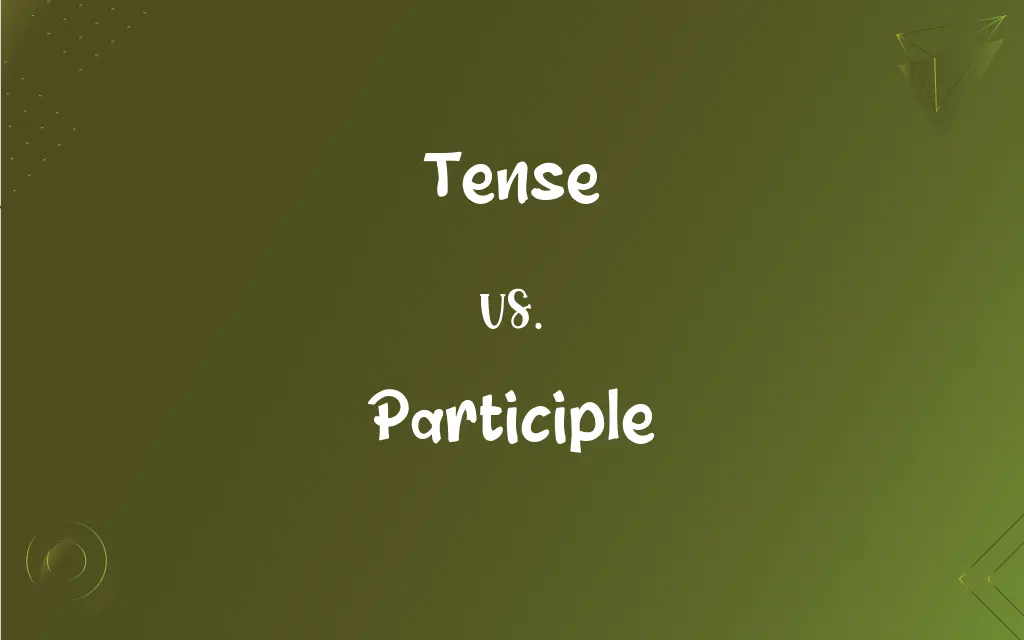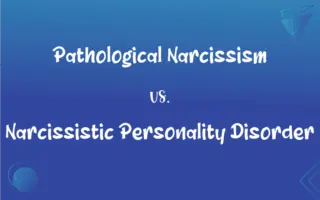Tense vs. Participle: What's the Difference?
Edited by Aimie Carlson || By Janet White || Published on February 21, 2024
Tense indicates the time of action in a verb, while a participle is a verb form used as an adjective or to form verb tenses.

Key Differences
Tense in grammar refers to the time at which the action of the verb takes place, such as past, present, or future. Participle, on the other hand, is a form of a verb that can function both as an adjective and as part of certain verb tenses. While tense directly conveys when an action occurs, a participle modifies nouns or works within verb phrases to indicate aspects of time and condition.
English has three primary tenses: past, present, and future, each of which can be simple, continuous, perfect, or perfect continuous. Participles come in two forms: present participles (ending in -ing) and past participles (often ending in -ed, -t, -en, etc.). Tenses are essential for structuring sentences to convey time, whereas participles are versatile in their role within complex verb structures or as adjectives.
The use of tense is integral to the meaning of a sentence, as it situates the action or state in a specific time frame. Participles do not stand alone as verbs but combine with auxiliary verbs to form perfect or progressive tenses, or they modify nouns in a way similar to adjectives. This difference highlights their unique functions in sentence construction.
An example of tense in use is: “She walks to school” (present tense). In contrast, a participle example is: “Walking (present participle) home, she found a coin” or “Tired (past participle), she went to bed early.” These examples show how tenses determine the time of the verb, while participles add descriptive or tense-related detail.
Tenses are straightforward in their purpose, dictating when an action happens. Participles are more nuanced, providing additional layers of meaning, whether to describe a noun or to set the stage for the main verb in terms of time, mood, or aspect. Their interplay is vital in crafting the subtleties of verbal expression in English.
ADVERTISEMENT
Comparison Chart
Function
Indicates time of action
Verb form used as adjective or in tenses
Forms
Past, Present, Future
Present (ending in -ing) and Past (often ending in -ed, -t, -en)
Role in Sentence
Main verb structure
Adjective or part of verb phrase
Example Usage
“She eats” (Present Tense)
“Eating” (Present Participle) as in “Eating dinner, she watched TV.”
Grammatical Focus
Time of action
Describing or completing action
ADVERTISEMENT
Tense and Participle Definitions
Tense
Tenses in English are categorized into past, present, and future.
She studied for the exam (Past Tense).
Participle
Participles are used with auxiliary verbs to form verb tenses.
She has gone to the store (Past Participle in Present Perfect Tense).
Tense
Tense indicates the time when the action of a verb occurs.
He runs daily (Present Tense).
Participle
A participle is a verb form that can function as an adjective.
The barking dog was annoying (Present Participle).
Tense
Each tense can be simple, continuous, perfect, or perfect continuous.
They will be arriving soon (Future Continuous Tense).
Participle
Past participles often end in -ed, -t, or -en and complete an action.
The door, broken during the storm, needed repair (Past Participle).
Tense
Tense is crucial for conveying chronological context in sentences.
I will travel to Japan next year (Future Tense).
Participle
Present participles end in -ing and express ongoing action.
Laughing loudly, he entered the room (Present Participle).
Tense
Tense helps to express the duration and completeness of an action.
She has finished her homework (Present Perfect Tense).
Participle
Participles add descriptive detail or temporal layers to sentences.
Feeling tired, she decided to rest (Present Participle).
Tense
Tightly stretched; taut.
Participle
A form of a verb that in some languages, such as English, can function independently as an adjective, as the past participle baked in We had some baked beans, and is used with an auxiliary verb to indicate tense, aspect, or voice, as the past participle baked in the passive sentence The beans were baked too long.
Tense
In a state of nervous tension or mental strain
Was very tense before the exam.
FAQs
How many main tenses are there in English?
There are three main tenses: past, present, and future.
Can tense determine sentence meaning?
Yes, tense is crucial for understanding when an action occurs.
What is tense?
Tense refers to the time frame of the verb action.
What are the two types of participles?
Present and past participles.
Can a participle stand alone as the main verb?
No, it usually works with an auxiliary verb or as an adjective.
What is a participle?
A participle is a verb form used as an adjective or in forming verb tenses.
Can participles describe nouns?
Yes, participles can act as adjectives describing nouns.
Is “broken” a past participle?
Yes, “broken” is the past participle of “break.”
What is an example of a present participle?
"Walking" in “Walking home, she found a coin.”
Do all verbs have distinct past participle forms?
Most do, but some like “cut” remain the same.
What tense is used for habitual actions?
Present simple tense is often used for habitual actions.
What is a common use of past participles?
Past participles are commonly used in passive constructions.
What is the role of a participle in a sentence?
It functions as an adjective or forms part of a verb tense.
How does tense affect verb conjugation?
Tense changes the form of the main verb in a sentence.
How does future tense differ from present tense?
Future tense describes actions that will happen, present tense describes current actions.
What is the difference between “walk” and “walking”?
“Walk” is the base form, while “walking” is the present participle.
How do participles enhance sentence meaning?
They add descriptive or temporal details to the sentence.
What is the past tense form of “run”?
“Ran” is the past tense of “run.”
How is a participle used in perfect tenses?
A past participle is used with “has/have/had” to form perfect tenses.
Can tense indicate completed actions?
Yes, particularly the past and perfect tenses.
About Author
Written by
Janet WhiteJanet White has been an esteemed writer and blogger for Difference Wiki. Holding a Master's degree in Science and Medical Journalism from the prestigious Boston University, she has consistently demonstrated her expertise and passion for her field. When she's not immersed in her work, Janet relishes her time exercising, delving into a good book, and cherishing moments with friends and family.
Edited by
Aimie CarlsonAimie Carlson, holding a master's degree in English literature, is a fervent English language enthusiast. She lends her writing talents to Difference Wiki, a prominent website that specializes in comparisons, offering readers insightful analyses that both captivate and inform.







































































